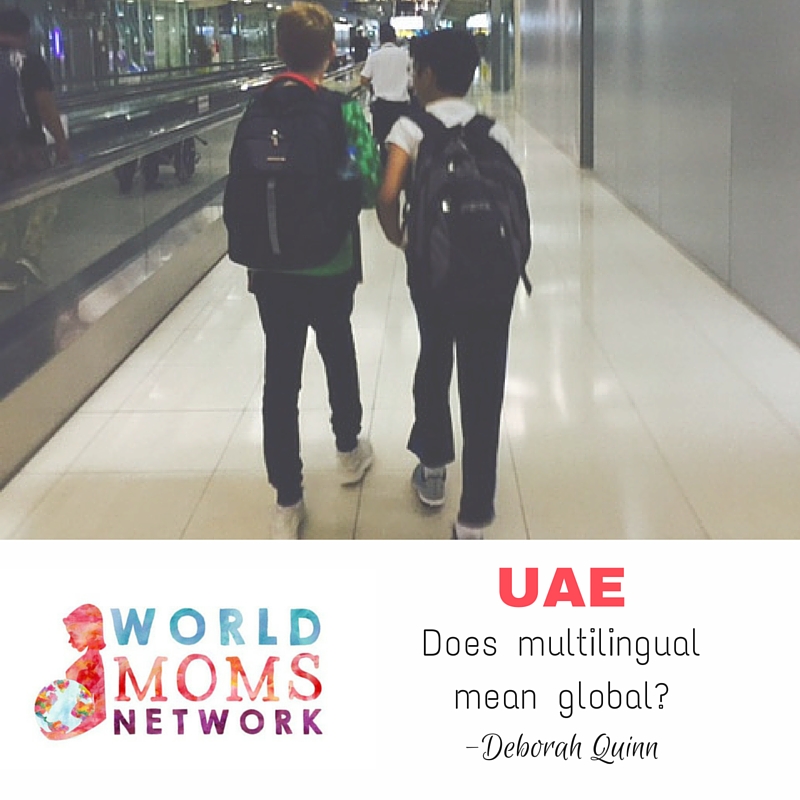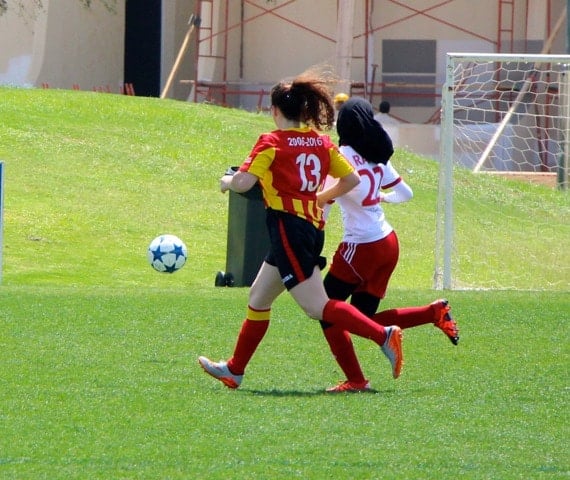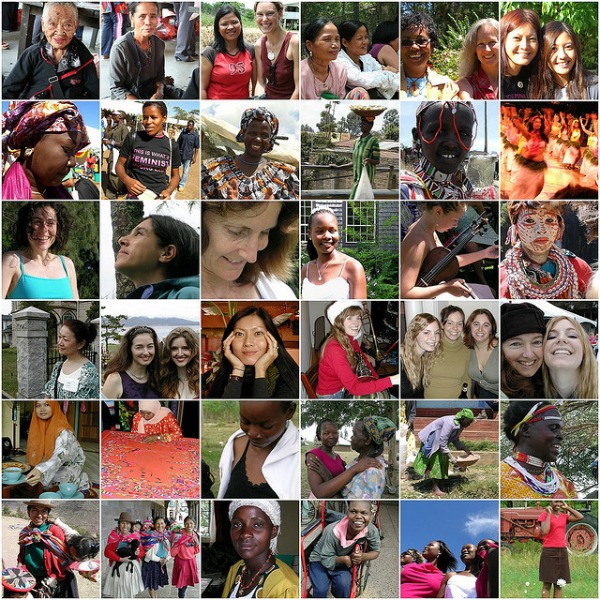by Mannahattamamma (UAE) | Jun 30, 2016 | Africa and Middle East, Brothers, Competition, Cultural Differences, Expat Life, Global Citizenship, Living Abroad, Middle East, Older Children, School, Travel, UAE, World Motherhood

When we moved to Abu Dhabi from Manhattan five years ago, we intended to stay in “the Dhabs” for a year. Our kids had scored the Manhattan Grail: spots in a “gifted and talented” public school, which meant we wouldn’t have to sell everything we owned to pay for private school, and if we stayed away from the city for more than a year, we would lose the seats.
“But you have two spots at the school,” people said to me when I told them we were leaving. To ease their doubts, I kept talking about the benefits of an international education and experiencing different cultures–but to tell the truth, I think I was trying to convince myself. After all, if you’re a student in a Manhattan public school, you’re going to be connect with kids from around the world; it’s unavoidable. Did we really need to move halfway around the world to get a “global experience?” I wondered.
Three-quarters through our first year, we decided to take the leap and sign on for another year (or four) of expat life. A year just didn’t feel like enough time: we would have been packing up to move back just as we were starting to settle in. I felt as if all the energy (and exhaustion and not a few tears) that went into adjusting would have been wasted if we returned to New York after just a year.
The boys are studying Arabic in school, and in our travels through the region, they’ve picked a few phrases here and there — mostly “hello” and “thank you” and “chocolate” — in Sinhalese, Punjabi, Italian, Swahili, Korean. The trips we’ve been able to take from Abu Dhabi would have been impossible from Manhattan, especially on the salaries of two literature professors, and so in that regard, our expat life has delivered the sort of global awareness we were hoping for.
Or at least that’s what I think on my optimistic days. On other days, I wonder: does the simple fact of being able to say “hello” in eight different languages really make you globally aware? I suppose my wavering back and forth is just the expat version of questions most parents ask themselves–“is this school the right school,” “are we doing the best we can for our kids”–and we all have good days and bad days in terms of those answers. How do we raise global citizens? That question, in the light of “Brexit” and the demagoguery of Trump, seems increasingly important, even as the answers get more complicated.
I had to confront those questions just the other day in an emotional conversation with my younger son (now almost twelve). We were sitting on his bed in a hotel room in Bangkok, where we’d come for the Global Round of the World Scholar’s Cup, an academic competition that draws kids from, yes, around the world (but mostly Asia). I’d asked C. if he were nervous about the upcoming three days of competition in writing, debate, and current events quizzing, and his eyes welled up. He admitted that he wanted to do as well as his brother had, two years ago, in the same competition, but also, he said, “I don’t want you to feel like it was a waste for you to bring me here.”
Argh! A blow straight to the heart! How had he gotten the idea that my husband and I would resent the money we spent on airline tickets if he didn’t do well? Suddenly I was the one almost in tears.
I assured him that we didn’t think it was a waste at all and that we were ridiculously proud of him already, just for doing the work to get this far. “Being able to do things like this are why we moved to Abu Dhabi,” I said. “We couldn’t afford flying to Bangkok if we still lived in New York.” My son nodded, vaguely reassured (although still nervous and still in the grips of sibling rivalry).
Truth be told, he probably doesn’t believe me when I say that we’re proud of him already. In the mind of an almost twelve-year old boy, “winning” is pretty much the only thing that matters. Given that there are about 2,000 kids competing in his division, I’d say winning anything is a long shot. (Though if there were a category called “Minecraft knowledge,” he’d probably outscore the entire world.)
What I realized after our conversation, is that yes, this experience is part of why we moved to Abu Dhabi, even though at the time we’d never heard of the World Scholar’s Cup. Even with the international flavor of New York, this sort of intense week-long bonding experience with kids from around the world would not have been possible. This experience, of negotiating differences and finding connections across cultures, will go a long way (I hope) in establishing the foundations of a global citizenry.
C. will remember this week in Bangkok long after he’s forgotten how to say “hello” in Sinhalese. For this week, at least, I’m pretty sure that becoming an expat family was the right thing for us to do.
What about you? How do you raise your global citizens?
This is an original post to World Moms Blog by Deborah Quinn, Mannahattamamma of the UAE. Photo credit to the author.
After twenty-plus years in Manhattan, Deborah Quinn and her family moved to Abu Dhabi (in the United Arab Emirates), where she spends a great deal of time driving her sons back and forth to soccer practice. She writes about travel, politics, feminism, education, and the absurdities of living in a place where temperatures regularly go above 110F.
Deborah can also be found on her blog, Mannahattamamma.
More Posts
Follow Me:


by Kirsten Doyle (Canada) | May 16, 2016 | 2016, Autism, Canada, Children with Disabilities, North America, Older Children, World Motherhood
I wake up in the middle of the night needing to use the bathroom. I tiptoe past my son’s bedroom, but in spite of it being about two in the morning, he is awake.
“Mommy!” I hear him whisper.
I go in, thankful that he finally understands the importance of not talking out loud while the family is sleeping. As I tuck him in, he reaches a hand up and touches my face.
“Lie down with Mommy on the bed,” he says, in his peculiar speech pattern and his even more peculiar voice that is teetering between boy and man registers.
Knowing that he will not get to sleep again without a cuddle, I promise to be back. I quickly use the bathroom, return to my son’s room and lie down beside him. We lie there for maybe a minute before he whispers again.
“I love you, Mommy.”
“I love you too,” I reply.
“Good night. Have beautiful dreams,” he mumbles, giving me a gentle but unmistakable shove. By the time I’m walking out of his room, he is fast asleep.
As I make my way to my own bed, I think about my son, about how far he has come and how far he still needs to go. He is twelve years old now, sprinting down the home stretch toward his teenage years. Nine years ago, almost to the day, he was diagnosed with autism.
Back then, when he was almost four, the only functional words in his vocabulary were “juice” and “pee”. He needed assistance with every single aspect of his daily living – toileting, getting dressed, eating, brushing teeth. Grocery store meltdowns were common, and washing my son’s hair could reduce him to a state of terror. Haircuts were absolutely out of the question.
Today, my son talks. Not a lot – not enough to have more than the most rudimentary of conversations – but he talks. He makes requests using full sentences, complete with “please” and “thank you”. He expresses emotions and makes jokes. He can pick out his own clothes, take a shower more or less by himself and even washes his hair. He hates it, but he understands that it has to be done. He can have haircuts now, even though I am the only one who can administer them and he keeps bunching his shoulders up.
As I look at him now and try to see into the future, I have no way of knowing what he will be capable of nine years from now. On the one hand, I don’t see him being able to live independently. He still lacks many life skills and, like many people with autism, he does not have an innate sense of danger and he does not know how to keep himself safe.
On the other hand, nine years ago I would not have foreseen the progress that he has made up to this point. I would not have thought that a kid who once had two usable words would be saying things like, “Have beautiful dreams”. So who knows what another nine years will bring?
We will only find out by continuing to steer him out of his comfort zone and into unknown territory.
How do you deal with challenges faced by your child? Do you wonder what your kids’ futures look like?
This is an original post to World Moms Blog by Kirsten Doyle. Photo credit to the author.

Kirsten Doyle was born in South Africa. After completing university, she drifted for a while and finally washed up in Canada in 2000. She is Mom to two boys who have reached the stage of eating everything in sight (but still remaining skinny).
Kirsten was a computer programmer for a while before migrating into I.T. project management. Eventually she tossed in the corporate life entirely in order to be a self-employed writer and editor. She is now living her best life writing about mental health and addictions, and posting videos to two YouTube channels.
When Kirsten is not wrestling with her kids or writing up a storm, she can be seen on Toronto's streets putting many miles onto her running shoes. Every year, she runs a half-marathon to benefit children with autism, inspired by her older son who lives life on the autism spectrum.
Final piece of information: Kirsten is lucky enough to be married to the funniest guy in the world.
Connect with her on Facebook, Twitter and Instagram.
Be sure to check out her YouTube channels at My Gen X Life and Word Salad With Coffee!
More Posts
Follow Me:




by Mannahattamamma (UAE) | May 5, 2016 | Boys, Equality, Feminism, Girls, Middle East, Older Children, Sports, UAE, World Motherhood

The other day I went to my teenage son’s soccer tournament, and because his game was delayed, I watched a girls’ match finish on the other field. Actually, thanks to the British history in Abu Dhabi, I should say that I went to the “football fixture,” watched the girls play “on the other pitch,” and then at the end of the day took my son to the sports store so he could buy a new pair of “boots” (not cleats). Who knew when we moved here five years ago that one of the ways we would adapt is learning to speak a different version of our native tongue?
As I watched the girls’ match, two girls maneuvered the ball across the pitch, their teammates shrieking encouragement. One girl—a headscarf covering her hair, and leggings under her athletic shorts—passed the ball to her teammate, whose long ponytail was streaked light blue. They brought the ball down the pitch—passed left, passed right—and then Ponytail shot for the goal. The ball bounced off a goal post, looked like it was going to go wide, and then sank into the back of the net past the goalie’s outstretched hands.
“Nice shot,” murmured my son. “Really good pass, too.” Neither of us knew the girls who were playing, but his comment made me happy nevertheless. As the mother of sons, I collect “girl power” moments like this one to remind my sons that they do not have the market cornered on sports excellence. Now that he’d seen for himself, I wouldn’t have to risk being Tiresome Mom by pointing out that those were girls playing pretty kick-ass football.
It’s easy to see in this little episode a lesson about hijab not being the symbol of oppression that so many non-Muslims are quick to assume it is. This girl left her opponents in the dust as she raced down the field, and she pounded her thighs in elation when the ball went into the net. Her war whoop as she ran to the sidelines to celebrate with her teammates would be recognized anywhere as the screech of a happy athlete.
But that’s not really the point. The point has to do with the fact that my fifteen-year-old son didn’t notice the headscarf or the leggings—or the blue ponytail, for that matter—he noticed the football. He noticed what the girls were doing, not what they looked like. As my son moves closer to manhood, a process that seems to be unfolding faster and faster despite my attempts to keep him “my boy” as long as I can, I wonder if my feminist politics have rubbed off: will he become a man who sees what women can do rather than how they look or what they’re wearing?
Isn’t that the question we ask ourselves as our children—those firm little packages of flesh that seemed at one point soldered to our hips—move out into the world: we want to know if our lessons have sunk in, if they’ve been listening even as they seem glued to the Snapchat world in their phones. Does my darling son talk about girls as “hotties” when he’s with his buddies; does he chime in when the conversation turns to which girl has the best body and why?
I don’t know. All I can know is that the other day, what he saw was two people playing great football.
Who knows. Maybe if enough children grow up appreciating what people can do, rather than what they look like or what they do (or don’t) wear on their heads, the world might become a more level playing field pitch.
How do you create awareness about gender equality for your children?
This is an original post to World Moms Blog by Deborah Quinn, Mannahattamamma of the UAE. Photo credit to the author.
After twenty-plus years in Manhattan, Deborah Quinn and her family moved to Abu Dhabi (in the United Arab Emirates), where she spends a great deal of time driving her sons back and forth to soccer practice. She writes about travel, politics, feminism, education, and the absurdities of living in a place where temperatures regularly go above 110F.
Deborah can also be found on her blog, Mannahattamamma.
More Posts
Follow Me:


by Karyn Wills | Feb 22, 2016 | 2016, Boys, Life, New Zealand, Oceania, Older Children

The Skyswing over Rotorua, New Zealand
It’s one of those truths that have become a cliché: having children challenges and changes you. I’ve changed in many ways thanks to the boys pushing emotional buttons and exhausting me to the point of raw survival. I’ve faced many a demon I didn’t know was lurking in my psyche. Those I expected, although the extent of it all still surprises me. This new place is a bit of a shock.
My latest evolutionary leap is to become brave around physical challenges.
I was the girl who would read rather than just about anything. I played with cut-dolls and made up plays and dances, I built indoor huts and had umpteen projects on the go. I did swim, climb a little, build dams and ride horses but I never really pushed my limits, not really. I kept myself safe. I was an expert at that. And then I had three sons who like to do stuff.
Suddenly, I’m in largish surf being a support Mum at a beach camp. I’m swinging on some revolting swing above a hill slope in which you have to be strapped with a harness and you look down directly at the ground from swear-inducing heights. I luge. I hike through bush where there are no other people and try not to think about abductions and falls while we’re out of cell-phone range. I’m jumping off river banks and wharfs from three or four metres up.
And I’m still scared witless. At least in the beginning.
Then I do the thing and repeating it is O.K. Sometimes multiple repeats of challenges are asked of me. Sometimes I allow myself to be convinced. Those boys have a way of parroting me back to me.
“You can do it.”
“We’ll be so proud of you.”
“It’s really fun!”
“Don’t psyche yourself out.”
“Do it when you’re ready.”
“You don’t have to, but I think you’ll regret it if you don’t.”
“Do you need a hug?”
“Let’s do it together.”
“Just go for it.”
And the really annoying one that I say all the time : “You feel brave after doing the scary thing.”
And so I have luged when I would rather have sat and had coffee. I’ve been in the surf when wine in a pretty dress was more my style. I swung on that horrendous swing. I jump off the river bank and the wharf. And you know what, they’re right. I feels good to be brave. And it really does happen after you do the scary thing. I expect they’ll continue to encourage me to do the stuff I don’t want to do and that’s pretty awesome because I’m an old mum and my kids want to do stuff with me. Then they’ll leave me and I suspect those will be some of my favourite memories around parenting.
Have you done anything physically brave thanks to the encouragement of your children? Tell us about it.
This is an original post to World Moms Blog by Karyn Wills of New Zealand. Photo credit: www.loveoftheroad.wordpress.com (The Skyswing over Rotorua, New Zealand)
Karyn is a teacher, writer and solo mother to three sons. She lives in the sunny wine region of Hawke’s Bay, New Zealand in the city of Napier.
More Posts

by Mannahattamamma (UAE) | Feb 8, 2016 | 2016, Adolescence, Boys, Family, Humor, Middle East, Older Children, Parenting, Teenagers, UAE, USA
 Frequently I am embarrassed by the fact that I only speak one language. Many of my friends in Abu Dhabi speak at least two, and most of my students speak three or even four. A few years ago I tried to learn Arabic and was stymied by a simple fact: my brain is old. It’s that whole “old dog new tricks” thing, which is to say, my brain wanted nothing to do with new lexical and grammatical systems.
Frequently I am embarrassed by the fact that I only speak one language. Many of my friends in Abu Dhabi speak at least two, and most of my students speak three or even four. A few years ago I tried to learn Arabic and was stymied by a simple fact: my brain is old. It’s that whole “old dog new tricks” thing, which is to say, my brain wanted nothing to do with new lexical and grammatical systems.
Lately, however, I’ve been confronted with another new language and it’s proving equally difficult to master. In fact, maybe I will never master it.
It’s the language spoken by fifteen-year old boys in the twenty-first century in a first-world city. It’s both a spoken and a written language, comprised of monosyllables, grunts, emojis, and weird snapchat abbreviations. It’s a language that his friends speak fluently and one that he never deigns to translate to us, his parents.
Let me be clear: my son is the proverbial “good kid,” who still (occasionally) sits on my lap (usually when he wants a favor), does his homework without being asked, and is (sometimes) nice to his younger brother. But beyond that?
We get commentary about his basic human needs—food, sleep, wi-fi—and then he retreats into his digitally created iCocoon.
When I look at my son these days, the air seems full of ghosts; it’s like I’m seeing time, compressed and wispy, floating between the two of us. I see his baby self, staggering around the house with mushy graham crackers clenched in each fist, and I see other snippets of his childhood, too, hovering just beyond his (increasingly broad) shoulders. And at the same time, there’s the ghost of my own teenage self, snarling at my mother (sorry mom!) as I stand by the phone, willing The Cute Boy to call me.
The phone is a key difference in this linguistic and generational incomprehension. Those of you of a certain age will remember the days when houses had those things we now call “land lines,” which were anchored in a specific place and were frequently shared by the entire household. That meant that your TOTALLY ANNOYING younger siblings could pick up another extension and a) eavesdrop on your conversation; b) tell your mom what you were talking about; c) tease you mercilessly while you tried to be cool with The Cute Boy on the other end of the line.
Now, however, my son and his teenage friends carry a scrim of adolescence with them at all times, an endless stream of chitterchatter, gossip, sports scores, vaguely obscene quizzes, and god knows what else. Did you know it’s possible to have a scintillating conversation conducted entirely in poop and unicorn emojis, with the occasional emoti-face thrown in for good measure? It’s as if teenagers have all been transported into an ancient Egyptian civilzation and are fluent in hieroglyphs—yet another language I do not speak.
As I think about it, I am not sure, really, whether it’s that my son and I are speaking different languages or that his other language is omnipresent in a way that my teenspeak was not, because technology didn’t let it happen.
At some point I had to hang up the phone and turn off the TV, and engage with my family. Mind you, I wasn’t necessarily pleased about those engagements, but the world of “non-family” was regularly shut off.
Now, with smart phones, the external world is always ready to hand; there is always a way to tune out the family world.
I can hear you all, shaking your heads and muttering that we should set some boundaries and be firm about your expectations and teach your kid some manners and I bet that some of you, with small children, are thinking “my children won’t ever…”
Here’s the thing: I’ve thought all those things too. But then one night my son became fifteen and the battle lines got redrawn. How many times can we argue about how much phone use is too much; how many times can we discuss “reasonable use?” My son insists that I am the only parent who nags about such things, but my totally unscientific research suggests otherwise. I’ve talked with friends from Europe, Africa, the States, and elsewhere in the Middle East, and the screen-time battle seems to be an almost universal parenting problem.
If I think about it, the translation problems run in two directions. If my son could speak “parent,” then he would understand that in my repeated (and to him unreasonable) requests that he turn off his phone and talk to me, I am really saying “don’t grow up so fast, please don’t be in such a hurry to leave us behind.” He would understand that watching him grow up is lovely — and ineffably sad.
Maybe he’d understand if I put it in snapchat-ese for him. Can anyone translate into emoji for me?
How are things different now from when you were a teen? Do you find that the teens of today speak a different language?
This is an original post to World Moms Blog by Deborah Quinn, Mannahattamamma of the UAE. Photo credit to the author.
After twenty-plus years in Manhattan, Deborah Quinn and her family moved to Abu Dhabi (in the United Arab Emirates), where she spends a great deal of time driving her sons back and forth to soccer practice. She writes about travel, politics, feminism, education, and the absurdities of living in a place where temperatures regularly go above 110F.
Deborah can also be found on her blog, Mannahattamamma.
More Posts
Follow Me:


by Eva Fannon (USA) | Jan 14, 2016 | 2016, Awareness, Cancer, Girls, Health, Kids, Maternal Health, North America, Older Children, Sex, USA, Vaccines, World Voice, Younger Children

Many of us might hear the word “cancer” and automatically think that such a diagnosis would be a death sentence. This could be based on things we’ve heard, images we have seen portrayed in the media, or perhaps a personal experience – a friend or relative who has been affected by this “c” word. The truth is it greatly depends on the type of cancer…how early it is diagnosed…and whether or not a person has access to treatment.
In the US, January is #CervicalHealthMonth. Today we are talking it about it here because cervical cancer is an international issue and I’m sharing on World Moms Blog because it is an important topic to me, too. More than half a million women around the world are diagnosed with cervical cancer each year and over half of them die from the disease. The majority of these cases and deaths occur in low- and middle-income countries.(1) (more…)
Eva Fannon is a working mom who lives in the beautiful Pacific Northwest with her hubby and two girls. She was born and raised on the east coast and followed her husband out west when he got a job offer that he couldn't refuse. Eva has always been a planner, so it took her a while to accept that no matter how much you plan and prepare, being a mom means a new and different state of "normal".
Despite the craziness on most weekday mornings (getting a family of four out the door in time for work and school is no easy task!), she wouldn't trade being a mother for anything in the world. She and her husband are working on introducing the girls to the things they love - travel, the great outdoors, and enjoying time with family and friends. Eva can be found on Twitter @evafannon.
More Posts - Website
Follow Me:














 Frequently I am embarrassed by the fact that I only speak one language. Many of my friends in Abu Dhabi speak at least two, and most of my students speak three or even four. A few years ago I tried to learn Arabic and was stymied by a simple fact: my brain is old. It’s that whole “old dog new tricks” thing, which is to say, my brain wanted nothing to do with new lexical and grammatical systems.
Frequently I am embarrassed by the fact that I only speak one language. Many of my friends in Abu Dhabi speak at least two, and most of my students speak three or even four. A few years ago I tried to learn Arabic and was stymied by a simple fact: my brain is old. It’s that whole “old dog new tricks” thing, which is to say, my brain wanted nothing to do with new lexical and grammatical systems.






